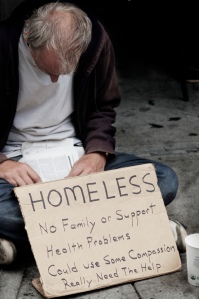**Editor's Note: The service on Sunday October 12th was an incredibly moving sermon on the easily forgotten human element of homelessness. The following post was written by DuPage Unitarian Universalist Church congregant, and frequent blog contributor, Ruth Elliott.**
Today the service was about homelessness. I wrote this in the Spring, and thought it was appropriate for the blog today. - Ruth Elliott
Dear Well Intentioned Friend,
I know your intentions were not unkind when we talked the other day. I'm certain you had no idea the affect your story would have on me, and I'm somewhat ashamed I didn't speak up more clearly at the time.

Okay, here's the thing. Your story? About your daughter's dance class being threatened by a lone homeless man, the one where the instructors bravely hid all the girls (who 'were practically dressed in bikinis') in the locker room to protect them? The story where the lone homeless man who may have been intoxicated, who likely
was mentally ill (spoken with your voice lowered), had come into the lounge near the studio and sat down to watch the tv, you remember? Do you remember telling me how horrified you were, what danger these girls were in. Do you remember when you first described the man that I said, poor thing, he was probably just looking somewhere safe to rest?

Here are some things I didn't tell you. I have worked with homeless people for the last ten years. Yes, many are mentally ill, many are alcoholic or addicts or both. All of them suffer greatly.
All of them are human beings, who love and are loved by someone. I didn't point out that mental illness and substance abuse are medical illnesses, just like cancer, or diabetics. I also didn't mention the reason many of them are homeless is because of inadequate resources to treat these disorders,and the tremendous negative stigma that goes along with being homeless, with being an alcoholic, with being an addict.

At one point while you were describing in great detail how horrifying and dangerous this man was, I did manage to quietly say, just like my son. I don't think you caught my meaning. I don't think you understood that what I was saying was that my son is homeless, that my son is mentally ill, that my son is an addict, that my son has curled up in all sorts of places trying to get some sleep, some comfort. I don't think you realized that while you talked about saving these girls from this threat, all I could see is the countless cruelties that the homeless, mentally ill suffer, that my son suffers. The diseases themselves and the heartbreak they cause to families are bad enough, but the stigma that well intentioned people attach to them and then use as a justification to treat them badly, as something less than human, and something not worth compassion, or love or comfort, the stigma is the worst of it all.
Change mentally ill to someone with cancer, with diabetics, suddenly it seems horrifying that someone suffering from cancer, or uncontrolled diabetes would be ostracized, would be seen as a threat to children.

Eventually all I could see was someone treating my son with the horror and disdain you very eloquently described, all I could see was the pain and the humiliation he has suffered. All I could see was my little boy being threatened, and there was nothing, absolutely nothing I could do to save him. All I could feel was all the pain and the heartbreak of the last several years as I fought to keep my son sane, sober and safe. You see, my well intentioned friend, I too am a mother, a very protective one, and I do understand the overwhelming desire to protect my children. My daughters took dance when they were young, I did my time sitting in studios, going to recitals, I do understand that part, to this day I would do anything to keep them safe. I also love my son with the same intensity, and I have done, and still do everything I can to protect him. Sadly with his disease part of doing what's best for him and my daughters is to let him hit a bottom so he can hopefully one day come back to me.
I couldn't tell you any of this. All I could do was to cover my face to hide the tears and run away. When I got to my car I sat for a very long while until I stopped crying and could drive home.

The other thing I didn't tell you is what I may have in common with the homeless man, I'm an alcoholic. I was raised by one and am related to several. The disease runs rampant in my family. I've been told to say I'm a person in long term recovery, meaning I'm sober and have been so for quite some time. I don't generally tell people this, because unlike, say cancer survivors, there aren't any coloured ribbons, or fun walks for alcoholics or addicts, even the clean and sober ones. People don't look at you as someone who has fought - and remains constantly vigilant - against a chronic and deadly illness, and survived, people see a drunk, an addict, someone who has a flaw in their moral character, someone who cant' be trusted, someone you can't leave your children with (yes, I have been at the receiving end of all these attitudes) people look at you as something that is
less than normal people. That's why I don't generally share that about myself. That is also why when you told me about the homeless man the first thing I felt was empathy for him, and the pain he must feel at fear and loathing that he experienced in your daughter's dance studio, and likely just about everywhere else he goes.
I didn't tell you any of this, because these things are usually too raw for me to say out loud. These things have brought judgement and negative stigma on me and my family, and some days I'm just not up to saying out loud that this is wrong. This is so very wrong. That it is not okay to view people as less than. No is less than anyone else. I think if people could get that straight in their heads the world could be a more compassionate and beautiful place.
So, maybe, next time you see a homeless person, someone who is mentally ill, intoxicated,maybe, you could let some compassion enter your viewpoint, and not let fear guide your thinking and actions, maybe you could lead with kindness and compassion, just a little at first. Or maybe you could, just for a moment, reexamine the way you view the homeless, the mentally ill, the addicted, the alcoholic. Maybe that could be a start.












